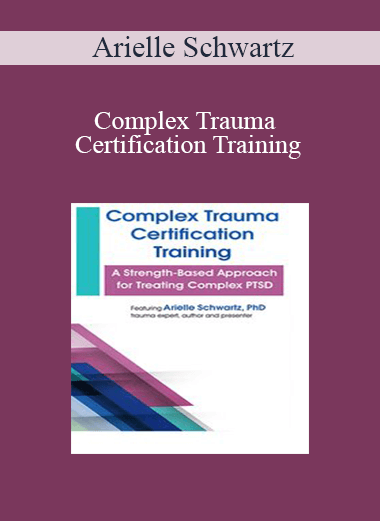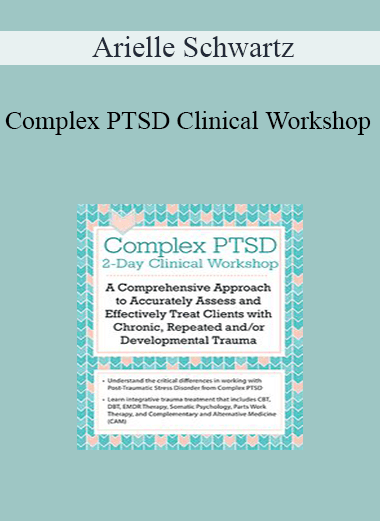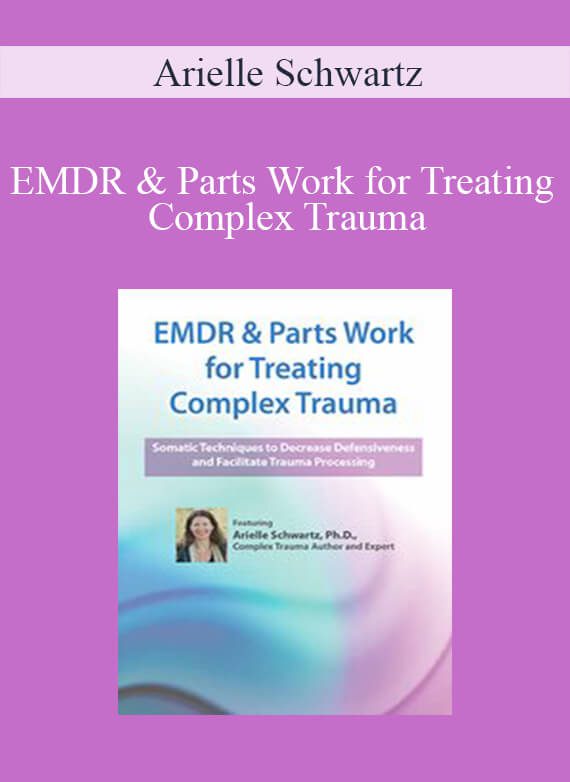Arielle Schwartz – Complex Trauma Certification Training: A Strength-Based Approach for Treating Complex PTSD
$599.99 Original price was: $599.99.$119.00Current price is: $119.00.
[Instant Download] – You will receive instant download access after the purchase
- Faculty:
- Arielle Schwartz
- Duration:
- 23 Hours 20 Minutes
- Format:
- Audio and Video
- Copyright:
- Nov 30, 2020
Description
*To earn your CCTP Level 2 Certification, you must already hold CCTP certification or evidence equivalency.
Handouts
| Manual – Complex Trauma Certification Training (11 MB) | 160 Pages | Available after Purchase |
Outline
Post-Traumatic Stress Disorder vs. Complex PTSD: Understand the Difference
- Acute traumatic stress, PTSD, Complex PTSD
- Diagnostic clarification, differential diagnosis and co-morbidities
- Key contributing factors of Complex PTSD
- The common symptoms of Complex PTSD
The Neurobiology of PTSD: Beyond Fight and Flight
- Polyvagal Theory
- Stages of trauma response
- Trauma specific psychopharmacology
- Heart Rate Variability and the Social Nervous System
- Interpersonal Neurobiology
- Psychobiological regulation
- Rupture and repair
- Implications of childhood neglect or abuse
- Neuroplasticity and Complex PTSD
Psychological and Physiological Repercussions of Complex PTSD: A Deeper Understanding for Accurate Assessment
- Intrusive symptoms and anxiety
- Emotional dysregulation: Outbursts of anger and debilitating shame
- Avoidance symptoms and phobic reactions to traumatic material
- Interpersonal problems and difficulty being close to others
- Dissociation and dysregulation
- Cognitive distortions and compromised meaning making
- Physical health problems, ACE factors and painful somatization
- Preverbal and nonverbal memories
- Disturbing somatic sensations
- Depressive symptoms
- Learned helplessness and shame
Therapeutic Interventions for Complex PTSD: Summary of Effective Therapies
- Psychodynamic and Relational Therapy
- Psychobiological perspectives: Polyvagal Theory
- Cognitive Behavioral Therapy (CBT)
- Dialectical Behavioral Therapy (DBT)
- EMDR Therapy
- Somatic Psychology
- Parts Work Therapy: Work with Ego States
- Complementary and Alternative Medicine (CAM):
mindfulness, yoga, and integrative healthcare
Integrative Treatment for Complex PTSD: Putting it All Together for an Effective Treatment Plan
- A Biopsychosocial Approach: Partner with clients to build a health care team
- Goal of treatment: Memory retrieval vs. trauma recovery
- History taking: Identify chronic, repeated, and/or developmental trauma events
- Cultural factors and Complex PTSD
- Recognize attachment injuries
- Identify parts, ego states and defenses
- Assess for dissociation (“fragmentation”)
- Clinical Vignette #1
- Mutual regulation and relational repair in therapy
- Prepare for trauma processing: Develop resources and stability
- Working with parts of self
- Work through traumatic memories: EMDR and Somatic Psychology
- Clinical Vignette #2
- Grief work in Complex PTSD
- Integrate and Instill positive change
Experiential Interventions: Mind-Body Practices for Clients with Complex PTSD
- Conscious breathing for self-regulation
- Grounding and sensory awareness
- Containment: Reclaim choice and control
- Build imaginal allies
- Cultivate mindfulness, acceptance, and self-compassion
- Somatic interventions: Titration, sequencing, and somatic re-patterning
- Bilateral stimulation and dual attention in EMDR Therapy
- Potential risks and limitations of mind-body therapies
Special Considerations in Complex Trauma Treatment
- Working with Preverbal and Nonverbal Memories
- Working with transgenerational trauma
- Somatization, Chronic Pain and illness
- Gate Control Theory
- Mindfulness, Yoga, and Compassion Based Interventions
- Clinical Vignette #3
Fostering Resilience: For Post-Traumatic Growth and Healing
- Learn the 6 Pillars of Resilience
- Trauma recovery and the bell curve
- Resilience as a process and an outcome
- Help clients move from learned helplessness to learned optimism
- Post-Traumatic Growth: Help clients reach their potential
Vicarious Trauma: Improve Client Outcomes Through Effective Self-Care
- Identify resources that improve your clinical skills
- In-session self-care to improve focus on the client and therapeutic process
- Burnout prevention techniques
Faculty
Arielle Schwartz, PhD Related seminars and products: 3
Arielle Schwartz, PhD, is a licensed clinical psychologist, Certified Complex Trauma Professional (CCTP-II) and EMDR consultant with a private practice in Boulder, Colorado. She is the co-author of EMDR Therapy and Somatic Psychology: Interventions to Enhance Embodiment in Trauma Treatment (Schwartz & Malberger, 2018, W.W. Norton) and the author of The Complex PTSD Workbook: A Mind-Body Approach to Regaining Emotional Control and Becoming Whole (Schwartz 2016, Althea Press).
Dr. Schwartz is an international presenter on EMDR therapy, somatic psychology, complex PTSD, attachment trauma, and the psychological treatment of chronic pain. She is a certified Kripalu yoga instructor offering therapeutic yoga for trauma recovery. Her integrative approach to therapy includes the synthesis of somatic psychology, EMDR therapy, structural integration theory, existential therapy, and Gestalt – all with a strong relational foundation of care.
Speaker Disclosures:
Financial: Arielle Schwartz is in private practice. She is an author for W.W. Norton and receives royalties. Dr. Schwartz receives a speaking honorarium from PESI, Inc.
Non-financial: Arielle Schwartz is a member of American Psychological Association (APA); EMDR International Association (EMDRIA); and Colorado Association of Psychotherapists (CAP).
Delivery Method
– After your purchase, you’ll see a View your orders link which goes to the Downloads page. Here, you can download all the files associated with your order.
– Downloads are available once your payment is confirmed, we’ll also send you a download notification email separate from any transaction notification emails you receive from imcourse.biz.
– Since it is a digital copy, our suggestion is to download and save it to your hard drive. In case the link is broken for any reason, please contact us and we will resend the new download link.
– If you cannot find the download link, please don’t worry about that. We will update and notify you as soon as possible at 8:00 AM – 8:00 PM (UTC+8).
Thank You For Shopping With Us!
Be the first to review “Arielle Schwartz – Complex Trauma Certification Training: A Strength-Based Approach for Treating Complex PTSD” Cancel reply
Related Products
Personal Development
Spirituality & Religion
Arielle Schwartz – Beyond Trauma to Healing & Happiness 2022


![[Audio Download] BT96 Clinical Demonstration 16 - The Use of the Genogram in Brief Therapy - Olga Silverstein](https://imcourse.biz/wp-content/uploads/2022/02/Audio-Only-BT96-Clinical-Demonstration-16-The-Use-of-the-Genogram-in-Brief-Therapy-Olga-Silverstein-MSW-100x100.png)




9 reviews for Arielle Schwartz – Complex Trauma Certification Training: A Strength-Based Approach for Treating Complex PTSD
There are no reviews yet.